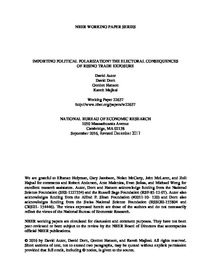Importing political polarization? The electoral consequences of rising trade exposure

Autor, David H. ; Dorn, David ; Hanson, Gordon H. ; Majlesi, Kaveh
National Bureau of Economic Research, Cambridge
NBER - Cambridge, MA
2017
63 p.
politics ; economic impact ; election ; trade
Working Paper
22637
Politics
English
Bibliogr.;Charts;Statistics
"Has rising import competition contributed to the polarization of U.S. politics? Analyzing outcomes from the 2002 and 2010 congressional elections and the 2000, 2008, and 2016 presidential elections, we detect an ideological realignment that is centered in trade-exposed local labor markets and that commences prior to the divisive 2016 U.S. presidential election. Exploiting the exogenous component of rising trade with China and classifying legislator ideologies by congressional voting records, we find strong evidence that congressional districts exposed to larger increases in import penetration disproportionately removed moderate representatives from office in the 2000s. Trade-exposed districts with an initial majority white population or initially in Republican hands became substantially more likely to elect a conservative Republican, while trade-exposed districts with an initial majority-minority population or initially in Democratic hands also become more likely to elect a liberal Democrat. In presidential elections, counties with greater trade exposure shifted towards the Republican candidate. We interpret these results as supporting a political economy literature that connects adverse economic conditions to support for nativist or extreme politicians"
Digital
The ETUI is co-funded by the European Union. Views and opinions expressed are however those of the author(s) only and do not necessarily reflect those of the European Union or the ETUI.